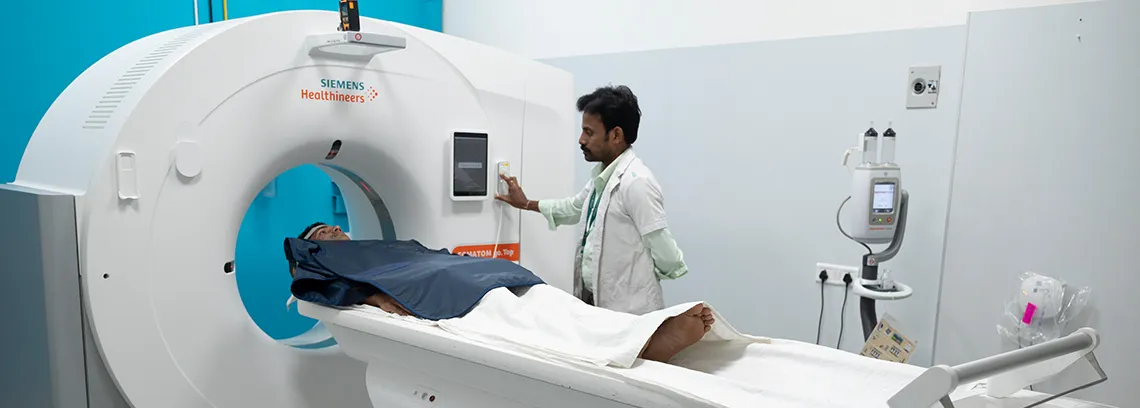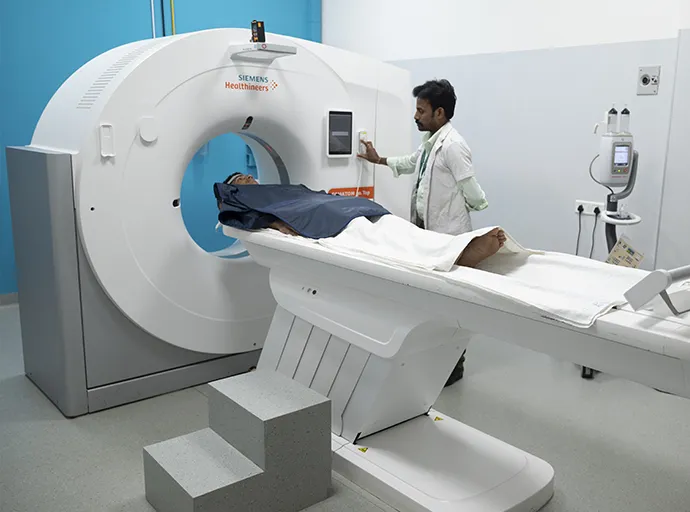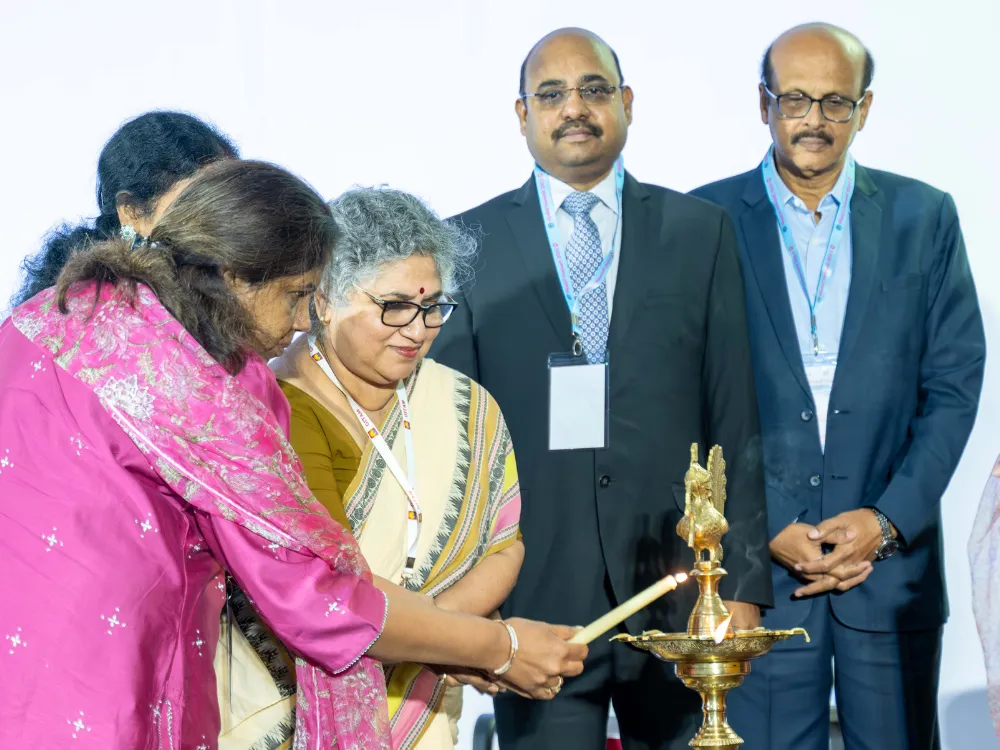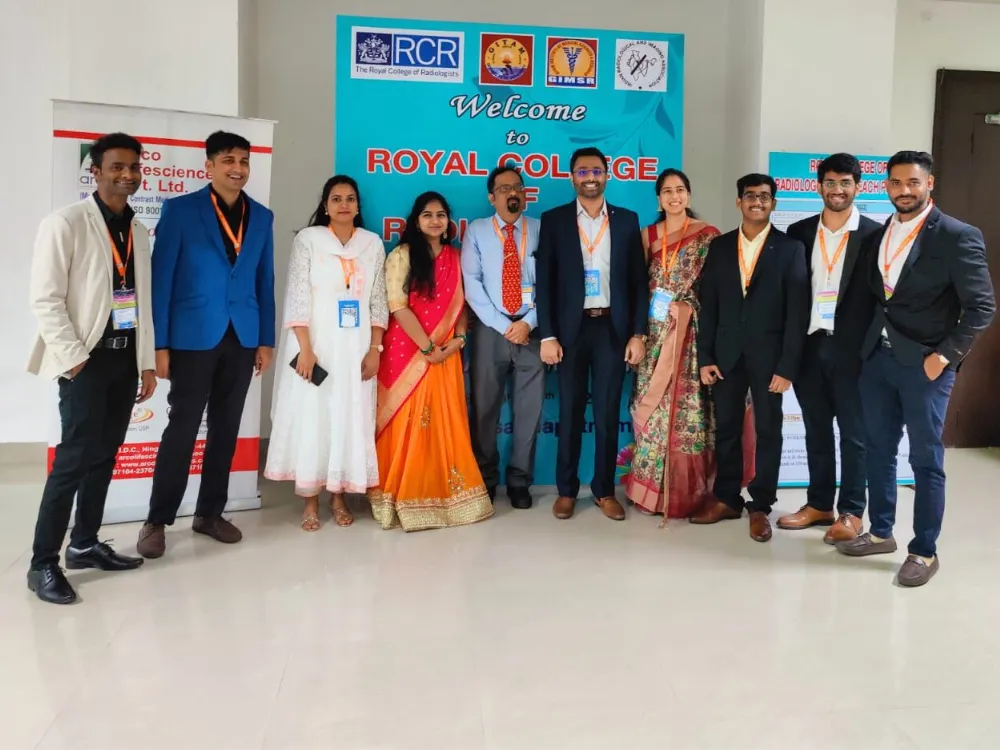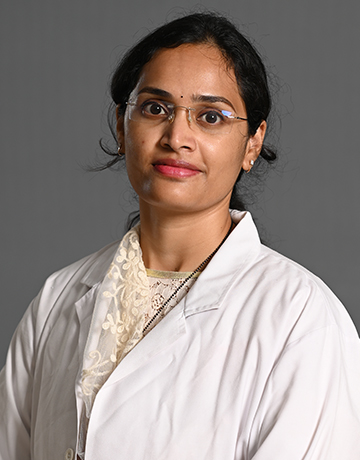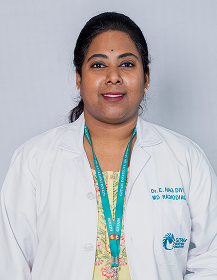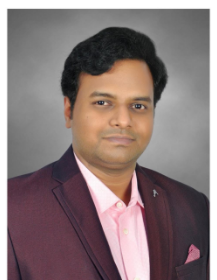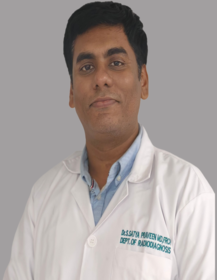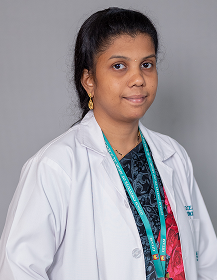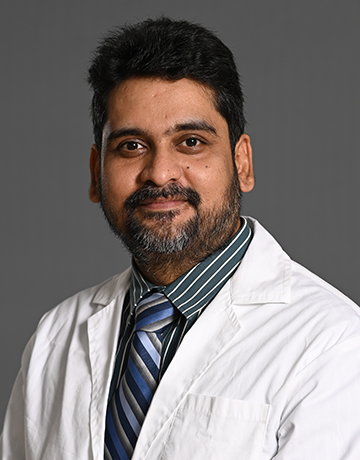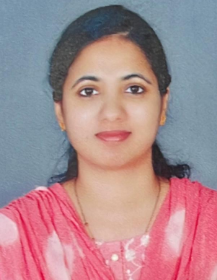
The Department of Radiology at GIMSR is a state-of-the-art center for diagnostic imaging and interventional radiology, playing a pivotal role in patient care, education, and research. Equipped with advanced imaging modalities including MRI, CT, digital radiography, ultrasound, and fluoroscopy, the department supports comprehensive diagnostic and therapeutic services across all medical and surgical specialties.
In addition to undergraduate teaching, the department offers a robust postgraduate (MD Radiodiagnosis) program, recognized by the National Medical Commission, aimed at training competent and skilled radiologists. Our faculty comprises experienced clinicians and academicians committed to excellence in teaching, research, and continuous professional development. The department actively engages in academic activities, interdisciplinary collaborations, and research initiatives, fostering a dynamic learning environment for students and residents.
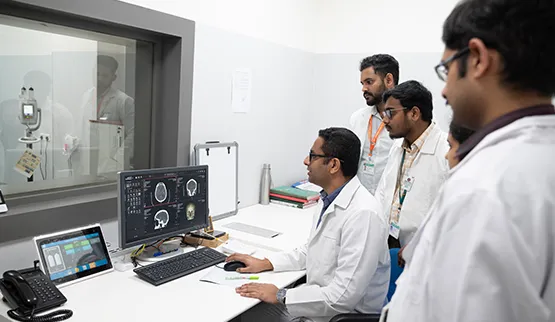
Facilities
The department is well equipped with a library and a museum.
The library boasts a curated extensive collection of national & international editions of textbooks, atlases, and contemporary journals in both print and digital format that support clinical excellence, academic rigor, and innovative research.
We are in the process of developing a museum with the theme of “Evolution of Imaging: A Walk Through Time” with an aim to
- Display of antique X-ray machines, early ultrasound devices, and film-based CT/MRI representations.
- Include historic radiographs, contrast media evolution, and radiation protection equipment.
- Interactive exhibits: timelines of imaging technology, landmark discoveries, and famous cases.
From Roentgen’s first X-ray plate to the era of functional imaging, the museum presents a visual timeline of radiology’s transformative journey.
The museum and library serve as active academic spaces where students and faculty connect theory, technology, and the clinical applications in imaging.
Diagnostic Imaging Services
- Conventional Radiography (X-ray): Digital and computed radiography for routine and specialized imaging, including fluoroscopic studies.
- Ultrasound & Doppler Imaging: High-resolution grayscale and colour Doppler studies across all organ systems, including fetal imaging and vascular assessments.
- Mammography: Digital mammography for breast screening and diagnostics.
-
Computed Tomography (CT): The Siemens SOMATOM go.TOP is a versalite 128 slice Computed Tomography scanner equipped with cardiac, neuro, angiography imaging along with general medical diagnostic services.
- MRI Services: 1.5 Tesla MRI system offering advanced neuro, musculoskeletal, abdominal, and cardiac imaging, along with MR angiography and functional MRI.
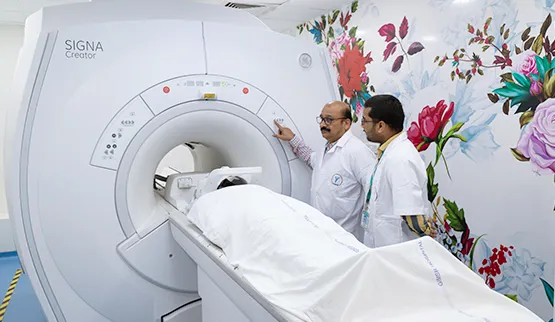
Interventional Radiology Services
- Cath Lab (Digital Subtraction Angiography – DSA): A dedicated interventional suite for diagnostic and therapeutic procedures including Vascular / Non-vascular / Neuro interventions.
The department is also equipped with PACS (Picture Archiving and Communication System), RIS (Radiology Information System), and advanced workstations to support postgraduate training, research, and interdisciplinary collaboration. Regular case discussions, workshops, and hands-on training in diagnostic and interventional procedures are conducted to ensure competency and innovation in radiological practice.
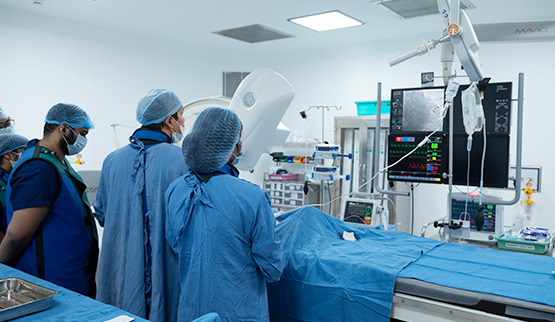
Academics
MBBS Undergraduate Program
Radiology forms an essential part of the MBBS curriculum offering medical students foundational knowledge in imaging relevant to clinical practice.
Teaching Components
- Didactic Lectures on imaging principles, radiation safety, and modality-specific applications in common clinical scenarios.
- Integrated Clinical Postings where students observe radiological procedures and correlate imaging with clinical findings.
- Demonstration Sessions on interpreting chest X-rays, abdominal ultrasound, CT/MRI scans, and trauma imaging.
- Radiology in Clinical Skill Training: Emphasis on appropriate imaging referrals and understanding the role of imaging in diagnosis and management.
MD Radiodiagnosis Postgraduate Program
The postgraduate program in Radiodiagnosis is a three-year course with an intake of 4 postgraduates per year. A competency-based curriculum has been designed to train future radiologists in both diagnostic and interventional imaging.
Key Highlights
- Comprehensive Clinical Training in all imaging modalities including X-ray, Ultrasound, CT, MRI, Mammography, and Interventional Radiology.
- Daily Academic Activities such as case presentations, journal clubs, seminars, interdepartmental meetings, and mortality reviews.
- Research & Thesis Work with faculty mentorship, access to a digital image archives, and support for national / international paper presentations.
- Ensuring exposure to subspecialties such as neuroradiology, musculoskeletal imaging, pediatric radiology, and onco-imaging.
- Hands-on Training in procedures like biopsies, drainages, vascular interventions, and contrast studies under expert supervision.
- Assessment & Evaluation through regular internal assessments, formative feedback, and mock examinations based on NMC guidelines.
Allied and Healthcare Professions UG Course
B.Sc. Radiology and Imaging Technology
The Bachelor of Science in Radiology and Imaging Technology is a four-year programme with 1 year of internship designed to equip students with the skills necessary to diagnose and treat various illnesses using advanced X-ray technology. This programme not only covers the technical aspects of radiology but also emphasises the importance of precision and attention to detail. Students will gain a thorough understanding of the equipment and techniques required for accurate imaging, preparing them for successful careers in this vital field of healthcare.
To excel in radiology, candidates must possess strong analytical skills and the ability to interpret complex technical data effectively. The Bachelor of Science in Radiology and Imaging Technology provides the foundational knowledge and practical experience needed to master the use of radiography equipment with the utmost accuracy. By completing this programme, students will be well-prepared to pursue a rewarding career in medical imaging, contributing significantly to patient care and diagnostics.
Teaching Methodologies
- Use of PACS-based teaching files, simulation-based learning, and case-based discussions.
- Interdisciplinary sessions with Surgery, Medicine, Pediatrics, Obstetrics & Gynecology, and Emergency Medicine.
- Access to National and International radiology resources, online CME programs, and academic radiology societies.
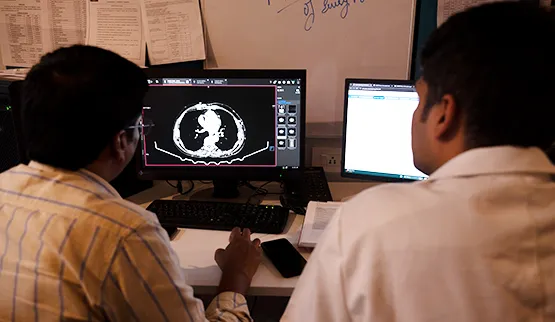
Conferences and Workshops
- Shakthi Summit 2024 Organized by Dept. Of Radiology, GIMSR in Association with Women's Wing Of IRIA.- Oct 19th - 20th 2024.
- Royal College Of Radiologists (UK) Outreach Programme Organized in Association with Dept. Of Radiology, GIMSR and Indian Radiological and Imaging Associations (IRIA) - Nov 18th - 20th 2022.
Faculty





